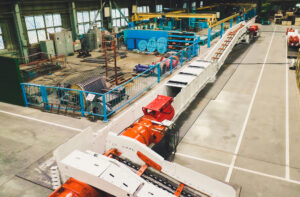
“Corum Druzhkovka Machine-Building Plant (Corum DrMZ), a part of Corum Group (DTEK Energy), plans to complete the delivery of the last batch of steel structures under a large order from DTEK Energy for the production of equipment for concentration plants in February 2025, the plant said on Facebook.
“In April-2024, the machine builders mastered the production of tanks, in June they added reloading devices, and in July the plant began working on the production of more than 500 units of metal structures of almost 100 varieties,” the statement said.
“Corum DrMZ clarifies that the largest parts in the order are 20 meters long and 2.2 meters wide, and their weight exceeds 4 tons. More than 400 tons of metal have already been used for manufacturing.
“There are high requirements for production, in particular in terms of welding seams and painting,” the plant notes.
“Corum DrMZ, which was relocated to Dnipro in 2022, according to the plant, produced 430 units of mining equipment in January-November this year, as well as more than 850 thousand units of components and spare parts.
In particular, in November, the company produced 5 units of shearers, more than 81 thousand components and spare parts, and repaired a KPD shearer. The products include trolleys, skip, cage, main ventilation fan, universal wheelsets, anchors, fire pipes and high-pressure hoses.
Corum Group is a leading mining equipment manufacturer in Ukraine. It is a part of DTEK Energy, an operating company responsible for coal mining and coal-fired power generation within Rinat Akhmetov’s DTEK energy holding.
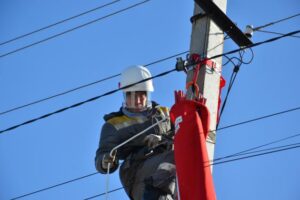
In November, amid intensified hostile attacks on the country’s energy infrastructure, DTEK Grids’ distribution system operators managed to restore electricity to almost 1 million Ukrainian families whose homes were cut off due to shelling in Odesa, Dnipro, Donetsk and Kyiv regions.
“The enemy intensified shelling of the country’s energy infrastructure in November. Lines and equipment were destroyed by missiles or drones. Most of all, in Odesa region, which suffered devastating attacks,” the company said in a press release on Monday.
Last month, power engineers managed to restore electricity to the homes of 701.7 thousand families in Odesa region.
Over the same period, DTEK Grids restored electricity to 4.8 thousand families in Kyiv region whose homes were cut off as a result of another hostile attack. In November, enemy shelling also damaged power grids and equipment in the capital, and power engineers promptly restored power to 1.1 thousand homes of de-energized families.
“In the regions close to the hostilities, the power system also suffered from enemy artillery shelling and air strikes. In the last month of autumn, the enemy continued to attack Dnipropetrovska oblast, especially the south of the region,” the press release explains.
Over the past month, power engineers in Dnipropetrovs’k region have managed to restore electricity supply to 192.1 thousand families.
In Donetsk Oblast, which remains the scene of the most intense fighting, power engineers managed to restore electricity to 75.5 thousand households in November. The company’s specialists continue to restore power grids in the frontline region every day, as soon as the security situation and the military allow.
“Since the beginning of the full-scale war, we have already restored electricity to 16.1 million families in Kyiv, Odesa, Dnipro, Donetsk and the capital,” said Alina Bondarenko, CEO of DTEK Grids.
“DTEK Grids develops the electricity distribution and grid operation business in Kyiv, Kyiv, Dnipro, Donetsk and Odesa regions. The company’s DSOs serve 5.5 million households and 158 thousand enterprises.
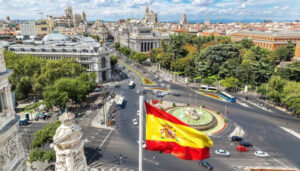
The number of foreign tourists who visited Spain in October increased by 9.5% year-on-year to 8.96 million people, according to the national statistics office INE.
This is a record figure for October in the entire history of observations, that is, since 1995.
Most of the tourists came from the UK last month – 1.79 million (+4.8% compared to October 2023), followed by Germany (1.3 million, +14% yoy), and France (1.16 million, +16.7% yoy).
The number of visitors from other European countries increased by 14.7% to 817.28 thousand people.
In October, 7.49 million tourists arrived in Spain by air (+7.8% yoy), 1.19 million by road (+17.7%), 265.48 thousand by water (+30.7%), and 27.18 thousand by rail (-2.5%).
Catalonia received the largest number of tourists (20.4% of the total), followed by the Balearic Islands (17.8%) and Andalusia (15.3%).
Total expenditures by visitors to the country increased by 15.5% year-on-year to 11.9 billion euros, or an average of 1,327 thousand euros per person. Tourism accounts for 12-13% of Spanish GDP.
In January-October, tourist arrivals to Spain increased by 10.8% to approximately 82.9 million people.
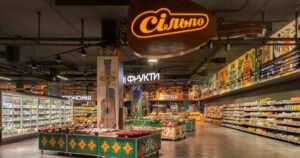
State-owned Ukrgasbank (UGB, Kyiv) has provided a UAH 226.6 million loan to Silpo supermarket chain to purchase more than 60 diesel generators, according to a press release from the financial institution.
“Uninterrupted power supply to supermarkets will contribute to their stable operation and, most importantly, guarantee the country’s food security,” the press service quoted Tetyana Parchevska, Director of Corporate Banking and Transaction Business at Ukrgasbank, as saying.
The state-owned bank did not disclose the rate at which the financing was provided or its term, citing the terms of the agreement.
According to the National Bank of Ukraine, as of October 1 this year, Ukrgasbank ranked 30th (UAH 199.05 billion) among 62 banks operating in the country in terms of total assets. The financial institution’s net profit for the first nine months of this year amounted to UAH 4.67 billion, while in the same period last year it was UAH 2.92 billion.
Silpo-Food LLC was established in early August 2016. According to Opendatabot, the founder of the company is PJSC Closed Non-Diversified Venture Corporate Investment Fund Retail Capital (100%, Kyiv), with Volodymyr Kostelman as the ultimate beneficiary. The chain’s total revenue in 2023 amounted to UAH 84.73 billion, which is 21% higher than in 2022.
According to its website, Silpo has 306 supermarkets in 60 cities of Ukraine and four Le Silpo delicatessens in Kyiv, Dnipro, Kharkiv and Odesa.
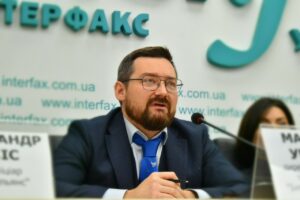
Maksim Urakin, Founder of the Experts Club Information and Analytical Center, PhD in Economics, shared his observations on key indicators and risks for the Ukrainian and global economies as of November 2024.
Macroeconomic situation in Ukraine
According to Maksim Urakin, Ukraine’s economy continues to show slow growth.
“According to the National Bank, in October 2024, Ukraine’s GDP grew by 1.3% compared to October last year. This is worse than the September figures, but significantly better than the data for the summer months. However, there are negative trends in agriculture. This year’s harvest was significantly lower than last year’s, which hit the agricultural sector, one of the key drivers of the economy,” said Maksim Urakin.
The expert also pointed to a sharp deterioration in the foreign trade balance.
“The deficit of foreign trade in goods increased by almost 6% over the first nine months, reaching a frightening $20 billion. The main reasons for this were the growth of energy imports and the lack of labor at export-oriented enterprises,” Urakin added.
According to the expert, Ukraine’s national debt is also a cause for great concern.
“As of October 2024, the debt is already 6.4 trillion hryvnias, or about $155 billion. At the same time, international reserves have decreased by more than $2 billion and amount to $36 billion,” Urakin emphasized.
Global economy: challenges and prospects
At the global level, the key risks are associated with the growing debt burden.
“Global public debt already exceeds $100 trillion, which is 93% of global GDP. In the coming years, this figure will continue to grow, which puts additional pressure on the budgets of most countries,” Urakin said.
The economies of developed countries, according to the expert, show heterogeneous dynamics. The United States is showing steady growth, with its GDP increasing by almost 3% in the third quarter. At the same time, the eurozone economy is actually stagnating, and Germany has faced zero dynamics, the economist said.
At the same time, China continues to play a key role in the global economy. “In the third quarter, China’s GDP growth remained at 5%, but the pace slowed due to geopolitical tensions and internal problems, particularly in the construction sector,” said Maksim Urakin.
Looking to the future
Maksim Urakin expressed cautious optimism about the long-term prospects.
“The global economy is facing many challenges, including inflation, geopolitical conflicts and protectionism. However, despite all the difficulties, there are reasons to believe that growth will continue at least within moderate limits,” he concluded.
The expert also called for more active international coordination to overcome economic challenges.
“Stability requires joint efforts, and only through dialogue and cooperation will we be able to minimize risks,” summarized Maksim Urakin.
You can learn more about current trends in the global economy in the video on the Experts Club YouTube channel: https://www.youtube.com/watch?v=grE5wjPaItI
You can subscribe to the channel here: https://www.youtube.com/@ExpertsClub
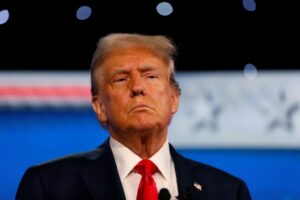
Relevance of World Trade Organization under scrutiny amid US president-elect’s protectionist stance
The sting of teargas was a price worth paying, said Michael Dolan, as he looks back on the Battle of Seattle and how the World Trade Organization’s attempt to break down the barriers to international trade was derailed by anti-globalisation protesters.
“The WTO has never recovered, it really hasn’t,” he said.
Dolan was one of the organisers of the blockades and marches that brought the Pacific coast city to a standstill in 1999 and plunged all attempts by WTO officials to construct a free trade agreement among more than 150 countries into disarray.
Developing world farmers and industrial workers in the US united against the move, which they saw as a neoliberal initiative in support of multinational corporations and an attack on their basic employment rights.
The WTO is under fire again, though this time from Donald Trump, whose return to the White House threatens to become an existential crisis for the global trade body.
Trump rejects the postwar mission to reduce barriers to free trade, including cuts to import tariffs, and argues they have mostly benefited China to the detriment of US businesses and workers.
Illustrating how much he believes a surcharge on imports will help US businesses, about three weeks before he secured a second term in the White House, Trump told an audience at the Economic Club of Chicago: “To me, the most beautiful word in the dictionary is tariff. It’s my favourite word. It needs a public relations firm.”
According to many WTO watchers, a rescue mission for the Geneva-based organisation is impossible since Trump gained control of the president’s executive powers and a Republican majority was confirmed in the US Senate and House of Representatives.
Within hours of taking office on 20 January next year, he could impose protectionist measures in breach of WTO rules on a host of countries, including China, the UK and the EU.
Last month he announced that he would sign an executive order placing a 25% tariff on all imports from Canada and Mexico, and a 10% duty on China, on top of existing duties, blaming drugs and migrants crossing US borders.
Dolan, who in 1999 was deputy of the Ralph Nader-funded pressure group Global Trade Watch, is happy to embrace Trump as a fellow critic of the way the WTO has put the price of goods above other criteria, such as the protection of homegrown jobs and decent wages.
China’s dominance of trade based on huge subsidies for its industrial base, undercutting US and European jobs, is another issue where Dolan and Trump see eye to eye.
“It is difficult to reconcile our victory in 1999 with the WTO decision to grant most favoured nation (MFN) status to China. It was like letting the fox into the hen house,” he says.
Only two years after abandoning its 1999 meeting in Seattle, the WTO met and agreed to bring China into the mainstream trade system, giving it the same MFN status that was designed for the poorest developing world nations.
From one perspective, it ushered in an era of cheap produce that lowered inflation to the benefit of consumers in the rich west. From another, it undermined jobs and living standards in countries that relied on a strong manufacturing base.
The overwhelming vote in favour of opening the door to communist China was widely seen as an emotional response to the 9/11 attack on the World Trade Center a few months earlier to unite the world against Islamist terrorists. It is one that many US Republicans and Democrats have come to regret.
Seeking to usher in a new era of global trade, the WTO met in Doha a year later to restart the Seattle talks and liberate agriculture, among other things, from protectionist rules. But the warm feelings had evaporated and objections from India, Brazil and US farmers prevented the “Doha round” from ever making progress. Despite a series of make-or-break meetings in the intervening 22 years, little progress has been made.
Alan Winters, a trade expert at the University of Sussex, says Trump has been a longstanding critic of China’s preferential treatment and will sign the death knell of the WTO whether he imposes tariffs or breaks from the multilateral WTO system to sign one-to-one sweetheart deals with his favoured nations.
“It is clear that multilateralism is very sick. The Doha round hasn’t yet been killed off, but it is deadlocked,” he says.
“And when the solution to avoiding tariffs is bilateral deals that lie outside the WTO system, it doesn’t look like getting better for the WTO any time soon.”
Julian Hinz, a trade expert at Germany’s Kiel Institute, said: “WTO rules still govern a big chunk of world trade. But the shift to protectionism means there is a risk the WTO declines into irrelevance.”
The nearest the organisation has come to recognising how Beijing’s massive manufacturing subsidies breach the rules can be found in a statement earlier this year that said there was an “overall lack of transparency” in the Chinese government’s financial accounting.
WTO rules are grouped into three main areas: goods, services and intellectual property
Created in 1995, the WTO is the permanent incarnation of the general agreement on tariffs and trade (Gatt), a set of regulations governing multilateral trade relations that had evolved since the 1940s.
WTO rules are grouped into three main areas: goods, services and intellectual property. According to the principle of the “single undertaking”, WTO members must accept all multilateral rules, ensuring they operate on an equal footing, although there are many clauses allowing countries to go their own way, especially if it means lowering protectionist barriers.
One reason for the failure of the Doha round is the need for all – now 166 members – to achieve a consensus, giving the director general, Ngozi Okonjo-Iweala, a headache whenever agreements need to be hammered out.
The first woman and first African to hold the position, she was blocked by Trump in his first presidency from taking office before an approving nod from the incoming Biden administration allowed her to ease past rival candidates.
In the past four years she has struggled through the pandemic and the inflation crisis that followed the Russian invasion of Ukraine to keep developing world organisations onside.
Considered a dealmaker rather than a smooth diplomat based on her former job as Nigeria’s finance minister, her main attempt to make some progress was a deal to share the intellectual property behind vaccines used in the pandemic. This was high on the wishlist of many developing world countries and championed by South Africa but was scuppered by the EU and UK, which sought to protect the interests of domestic pharmaceutical companies.
Okonjo-Iweala must also cope with a decision made by President Trump in his first term to block the appointment of judges to WTO courts, preventing the resolution of trade disputes.
In response to the latest threat from Trump, WTO officials met last month to reappoint Okonjo-Iweala, unopposed, for a second term before Joe Biden leaves office.
“What for?” asks Dolan. “Why does she want to do the job. The organisation is nothing more than a thinktank these days.”
Source: https://www.theguardian.com/world/2024/dec/03/can-the-worlds-trade-police-survive-trump-ii